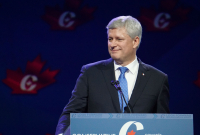Support strong Canadian climate journalism for 2025
As the relentless Ottawa sun roasted overzealous civil servants trying to shut down a little girls' lemonade stand on National Capital Commission property and then blazed brightly over a few thousand VIPs at the U.S. embassy's swish Fourth of July party, the capital was also quietly dealing with some political low pressure systems this week.
Even as Prime Minister Justin Trudeau travelled first to a secretive business conference in Idaho and then to the NATO summit in Warsaw to answer for Canada's military record, his government was also scrambling to conform to a rumbling human-rights tribunal ruling on First Nations children, and puzzling over what to do about a persistent labour dispute at Canada Post.
The Conservatives, meanwhile, lost high-profile MP Jason Kenney to provincial politics, leaving a gaping hole in their leadership contest to replace Stephen Harper.
Here's how federal politics touched Canadians this week:
WILL THE KIDS BE ALRIGHT?
Faced with an order from the Canadian Human Rights Tribunal to explain — by last Wednesday — how it would ensure First Nations children receive the same quality of social services as other kids, the federal government scrambled into action this week. Ministers announced $382 million over three years to implement Jordan's Principle — a commitment to make sure aboriginal children dealing with sudden, complex health problems or disabilities aren't snagged by competing bureaucracies and then forgotten. It's a commitment governments have made before, but without funding.
The Liberals also tabled a formal response to the tribunal, pointing to budget increases in funding for services on reserves.
First Nations leaders, however, pointed out that the needs of aboriginal children are immense, immediate, and extend beyond Jordan's Principle or gradually phased-in budget initiatives. Poverty and the number of First Nations children in foster care are shocking, they say, even though Trudeau has made aboriginal inequality one of his very top priorities.
Child welfare is inextricably linked to the issue of murdered and missing aboriginal women, and the government is poised to launch a long-awaited inquiry into that issue. Between the human rights tribunal ruling and the inquiry, the conditions of First Nations children will likely soon get a full airing.
POSTIES, PENSIONS AND PAY EQUITY
The labour dispute between Canada Post and its largest union, the Canadian Union of Postal Workers, intensified this week with Canada Post setting a Friday deadline for a lock-out, and then switching it to this Monday — all while CUPW proposed a pause.
Contract problems may seem like a postal perennial for regular people, many of whom have found other options to replace snail mail, but these talks are worth paying attention to for other reasons.
Canadians will get a taste of how the new Liberal government interacts with organized labour. Moreover, when the two sides eventually settle, their agreement on pension arrangements for new employees will likely set a standard for other Crown corporations and perhaps even for regular civil servants too. Like so many companies in the private sector, Canada Post wants new employees under defined-contribution pension plans — in which employees shoulder the financial risk — instead of the more traditional, more secure, defined-benefit plans. Most government employees have solid defined-benefit plans, and there are large sets of contract talks coming up this fall.
How much will the federal government intervene in the Canada Post impasse, and what pattern will the talks set for the billions of dollars in pension liabilities that Ottawa carries on its books?
EIGHT MORE YEARS?
Jason Kenney finally made it official this week and made the leap to provincial politics — leaving behind him at least a temporary vacuum in the federal political landscape. Without Kenney in the running to replace Stephen Harper as the leader of the Conservative Party, there is ample room for other Conservative candidates to come forward for the May 2017 contest. Except so far none of the big names have, and there is mounting chatter about high-profile potential candidates sitting this one out.
Is it because they see the Liberals as unbeatable for now? And if so, what does that mean for the quality of democratic debate in the House of Commons while Conservatives and their 98 MPs in the official Opposition are in limbo?
The Canadian Press





Comments